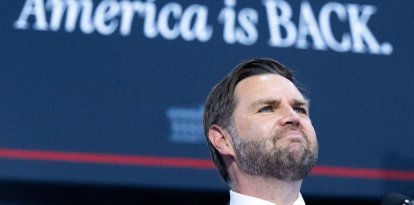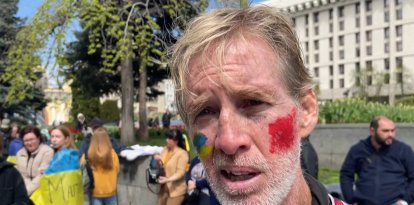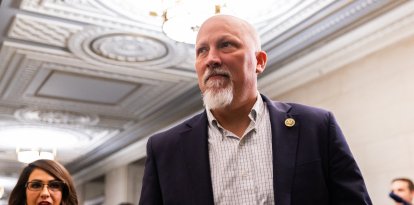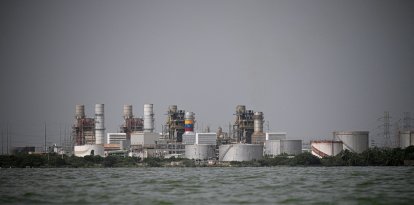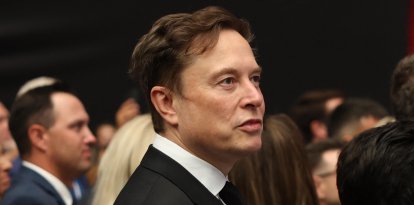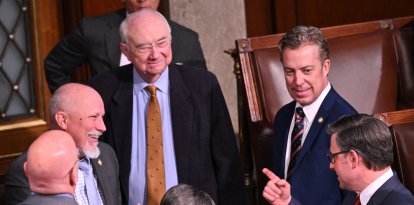Supreme Court debates Trump's birthright citizenship order
During more than two hours of arguments, the Supreme Court justices, showed a divided stance with a 6-3 conservative majority.

Supreme Court.
This Thursday, the U.S. Supreme Court upheld President Donald Trump's second-term executive order: restricting birthright citizenship.
This measure, signed on January 20, seeks to limit automatic citizenship to children born on U.S. soil whose parents are neither U.S. citizens nor lawful permanent residents.

Politics
Trump Administration asks Supreme Court to partially allow restrictions on birthright citizenship
Agustina Blanco
The Fourteenth Amendment
The legal basis for birthright citizenship in the United States is the Fourteenth Amendment, ratified in 1868 following the Civil War. This amendment states: "persons born or naturalized in the United States, and subject to the jurisdiction thereof, are citizens of the United States and of the state wherein they reside."
Its original purpose was to grant citizenship to former slaves and their descendants, overturning the infamous 1857 decision in Dred Scott v. Sandford, which denied citizenship to persons of African descent.
In 1898, United States v. Wong Kim Ark cemented the interpretation of the amendment. Wong, born in San Francisco to Chinese parents, was recognized as a U.S. citizen by the Supreme Court, which ruled that the Fourteenth Amendment includes the children of immigrants born on U.S. soil, provided they are “subject to the jurisdiction” of the United States.
The Trump Administration's stance
U.S. Solicitor General D. John Sauer defended the executive order before the Supreme Court, arguing that it protects "the meaning and value of American citizenship."
Sauer claimed that the Fourteenth Amendment was designed to guarantee citizenship to the children of former slaves, not to those of undocumented immigrants or temporary visitors.
According to the Administration, the "subject to its jurisdiction" clause excludes those without permanent legal status, reinterpreting the Wong Kim Ark precedent as applying only to children of parents with "domicile and permanent residence" in the United States.
In addition, the Administration questioned the authority of federal judges to issue nationwide injunctive relief blocking the order.
In that regard, Sauer called these measures a "pathology" that disrupts the balance of powers between the branches of government, arguing that universal injunctions “forcing the government to win everywhere while the plaintiffs can win anywhere."
The attorney general asserted that the universal injunctions paralyze the president and "disrupt the Constitution's careful balancing of the separation of powers."
"They operate asymmetrically, forcing the government to win everywhere, while the plaintiffs can win anywhere," Sauer said, and "create the ongoing risk of conflicting judgments."
The plaintiffs' arguments
Trump's order was challenged by 22 states led by Democratic attorneys general, as well as by pregnant women and immigrant rights organizations such as the American Civil Liberties Union (ACLU).
The plaintiffs contend that the directive directly violates the Fourteenth Amendment and more than a century of case law.
Liberal Judge Sonia Sotomayor, for example, asserted that the order contradicts multiple Supreme Court precedents and warned that, if it goes into effect, thousands of children would be born without citizenship, facing the possibility of statelessness and without access to essential services such as education, health care or employment.
For his part, Jeremy Feigenbaum, counsel for the plaintiff states, argued that national injunctions are necessary to avoid "significant pocketbook and sovereign harms" to the states.
In addition, he stressed that allowing variations in citizenship based on state of residence would be incompatible with the national unification achieved after the Civil War.
Kelsi Corkran, representing individual plaintiffs, urged the Court to avoid "catastrophic consequences" of a plan she called "unconstitutional."
The Supreme Court argument: a divided stance
During more than two hours of arguments, the Supreme Court justices, with a 6-3 conservative majority (including three Trump appointees), showed a divided stance.
The conservative justices, such as Clarence Thomas and Neil Gorsuch, appeared to lean toward limiting the power of lower courts to issue universal injunctions, agreeing with Sauer that such orders have proliferated in recent decades.
However, they also expressed reluctance to rule without addressing the legal merits of Trump's order, which could require more briefing and delay resolution of the case.
Liberal Judge Elena Kagan questioned how a case of clear illegality could be resolved quickly without domestic injunctive relief, while conservative Justice Amy Coney Barrett expressed skepticism about Sauer's proposal to litigate the case slowly in lower courts.
Sotomayor compared Trump's order to a hypothetical action that would violate constitutional rights, such as stripping citizens of their guns under the Second Amendment, underscoring the gravity of the move.
Implications and possible outcomes
The case before the Supreme Court does not focus directly on the constitutionality of Trump's order, but on whether lower courts have authority to issue nationwide injunctions.
If the Court limits these measures, Trump's policy could go into effect in the 28 states that did not file lawsuits, creating variable citizenship based on place of birth, something unheard of since the ratification of the Fourteenth Amendment.
On the other hand, if the Court upholds the injunctions, Trump's order will remain blocked nationwide, at least temporarily.
Reactions
The ACLU, 22 states, the District of Columbia and the city of San Francisco filed lawsuits the day after the order was signed, calling it "extreme" and unconstitutional.
Norman Wong, great-grandson of Wong Kim Ark, criticized the measure as divisive, saying it was "feeding off the American mindset, and it's not a healthy one."
Organizations such as the Congressional Tri-Caucus, which includes Asian, black and Hispanic caucuses, also condemned the order as violating the Constitution.
Pregnant mothers, such as Monica, a Venezuelan with temporary status in the United States, expressed fear at the possibility of her children being left without citizenship, especially in cases where they cannot obtain the nationality of their home countries due to the lack of diplomatic relations.
What's next
It is unclear when the Supreme Court will issue its ruling, although it is likely to do so before its summer recess at the end of June 2025. If the judges demand more information on the legal merits of the order, the ruling could be further delayed.
In the meantime, the order remains blocked nationwide due to injunctions issued by federal judges in Maryland, Washington and Massachusetts, among others.
Trump's executive order
This directive orders federal agencies not to recognize the citizenship of children born in the United States if they do not have at least one citizen or lawful permanent resident as a parent.
The measure primarily targets the children of undocumented immigrants and those with temporary status, such as students or workers on visas.

















